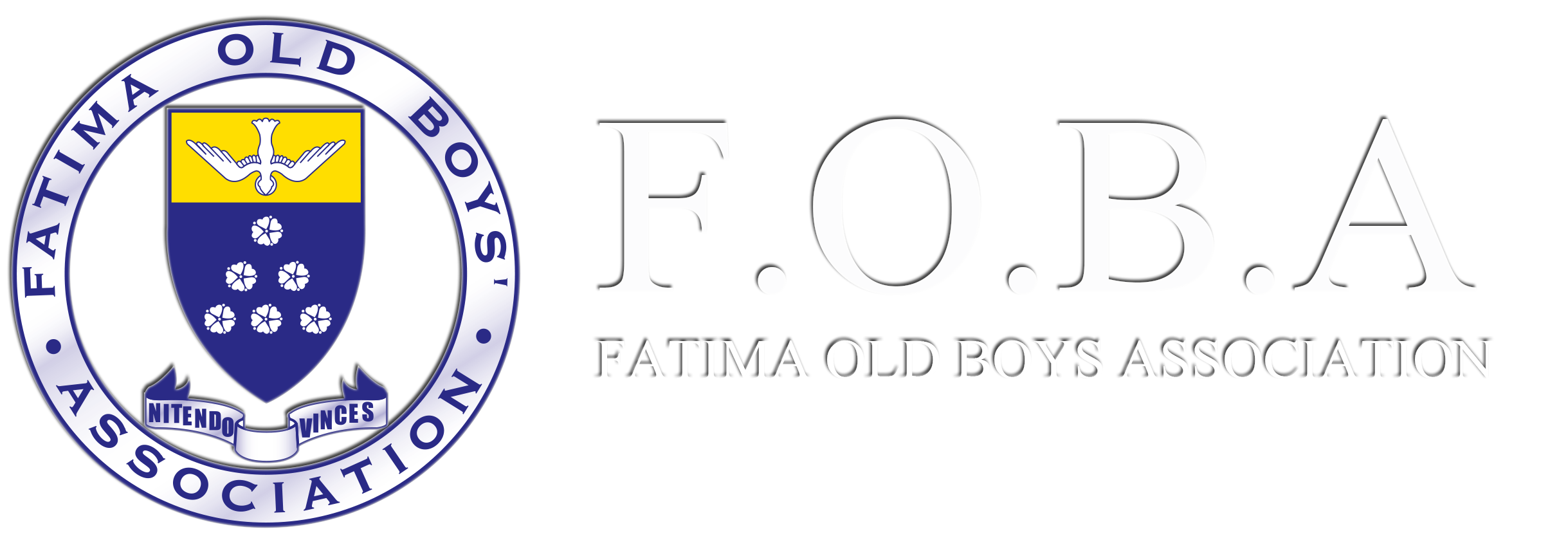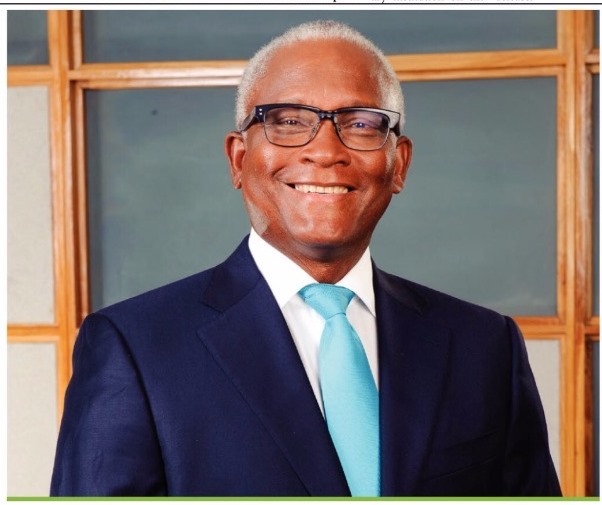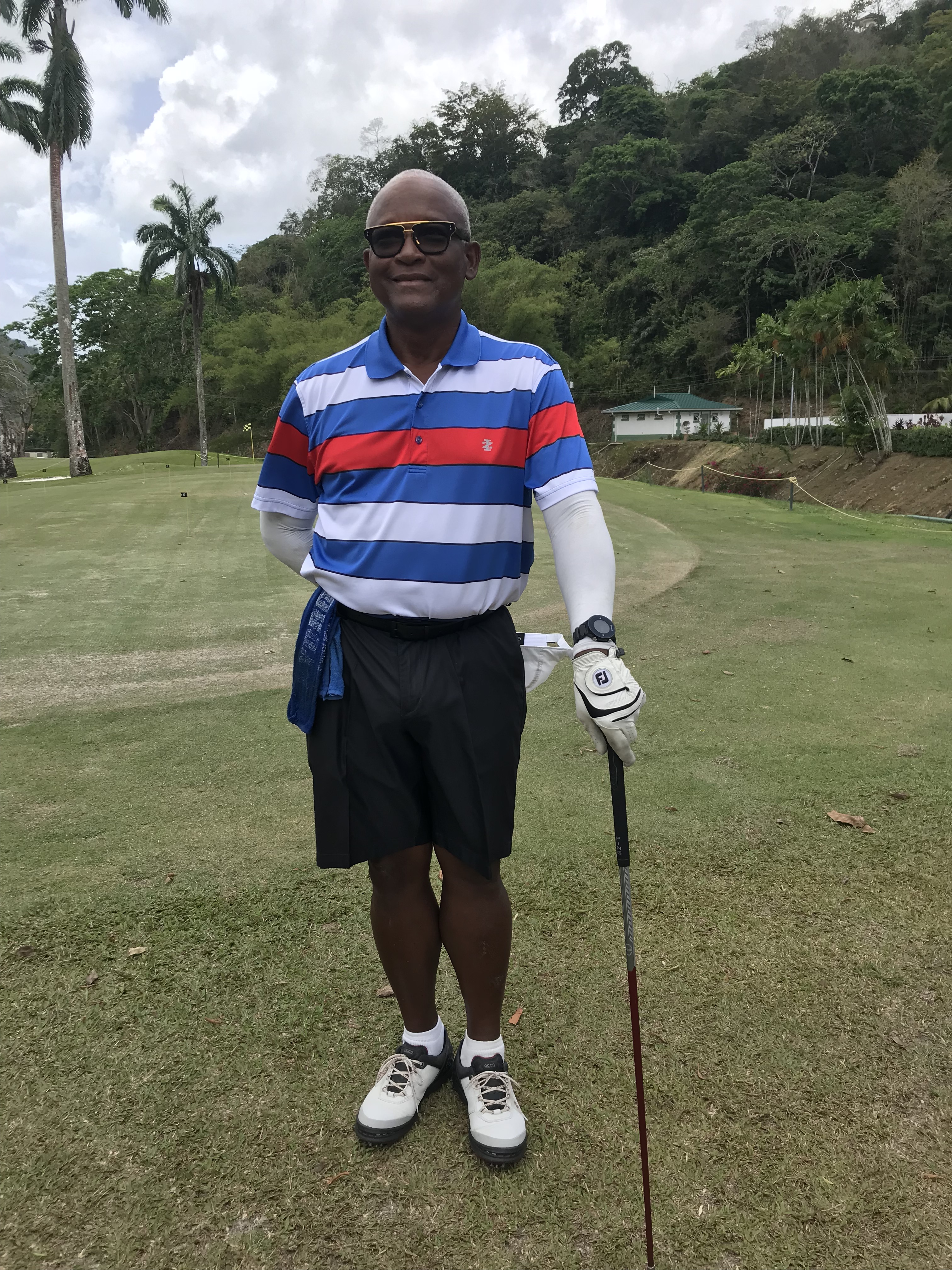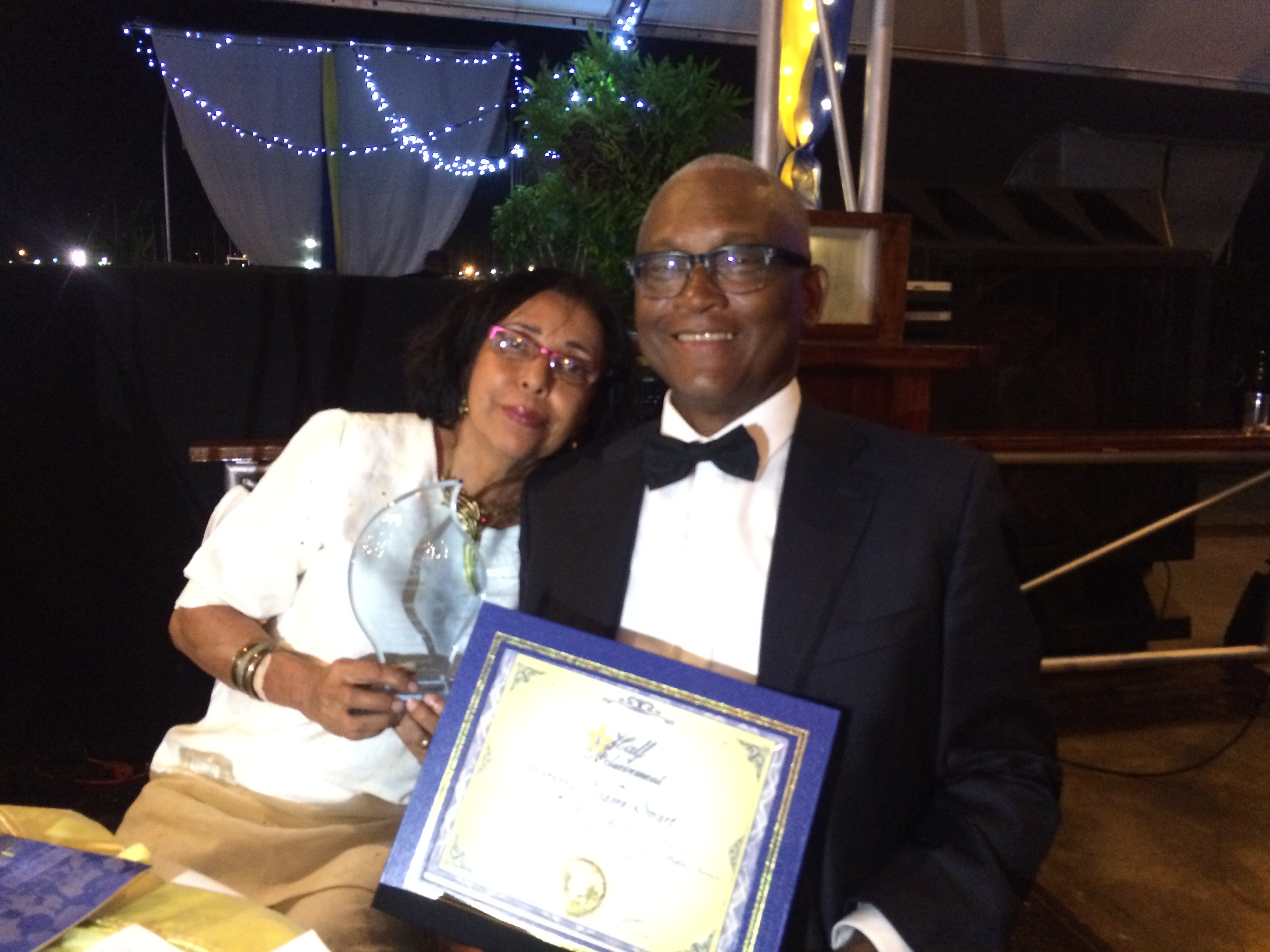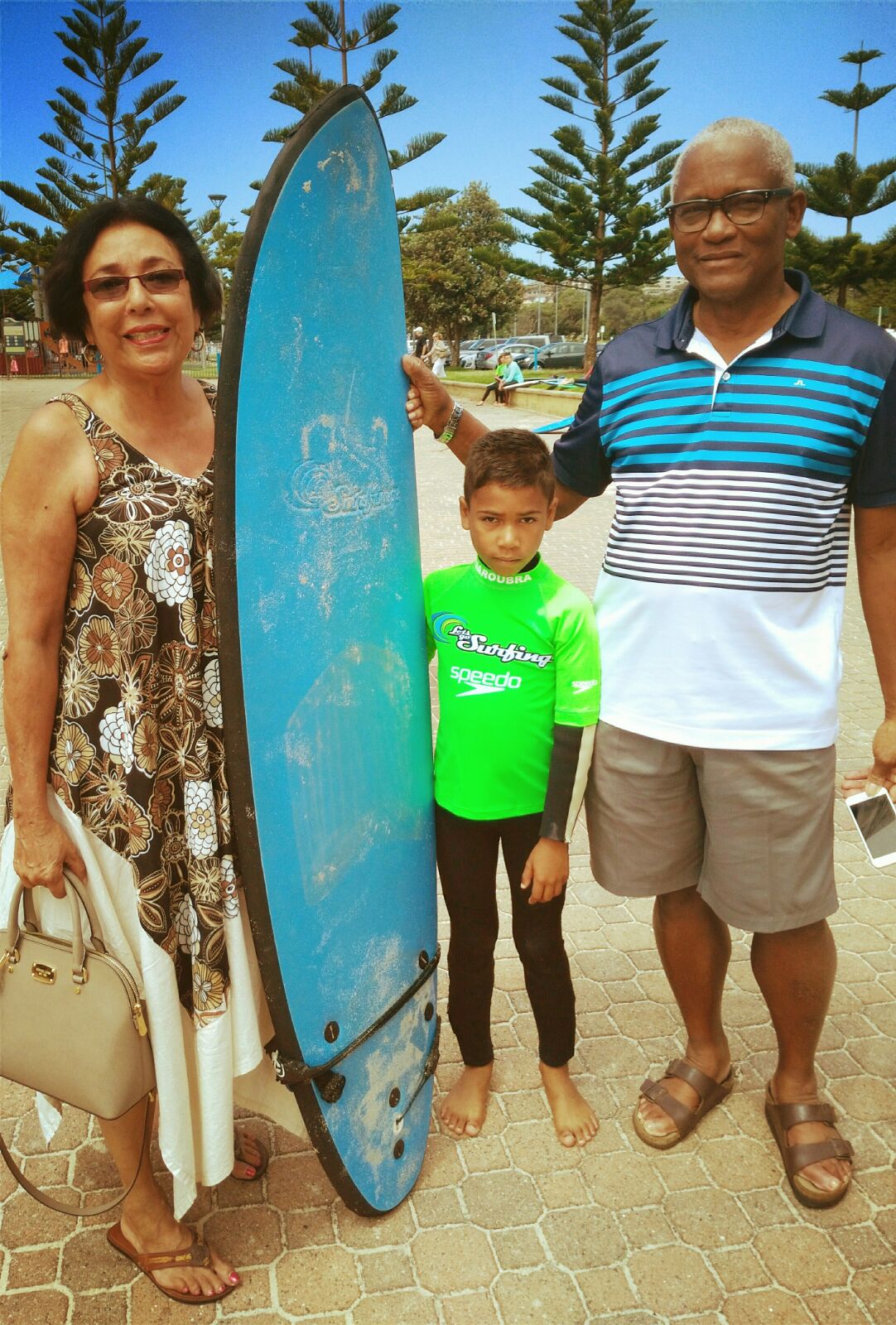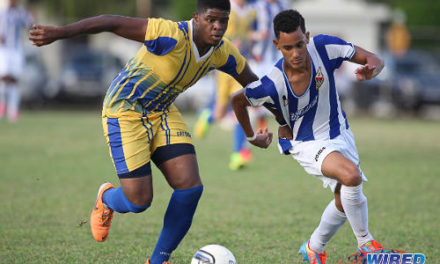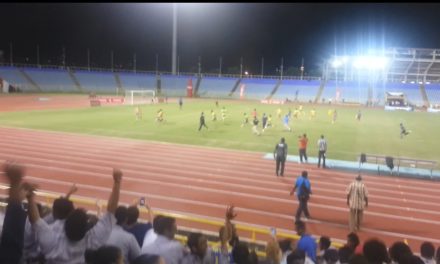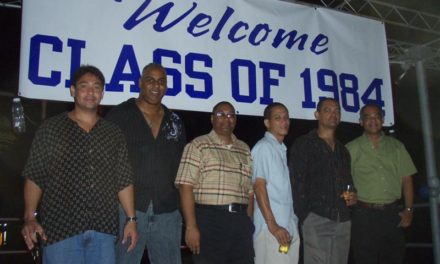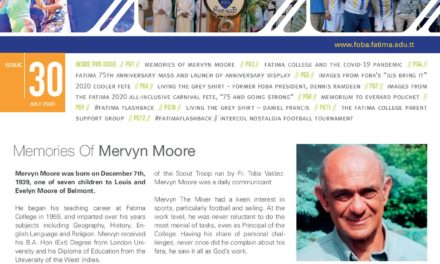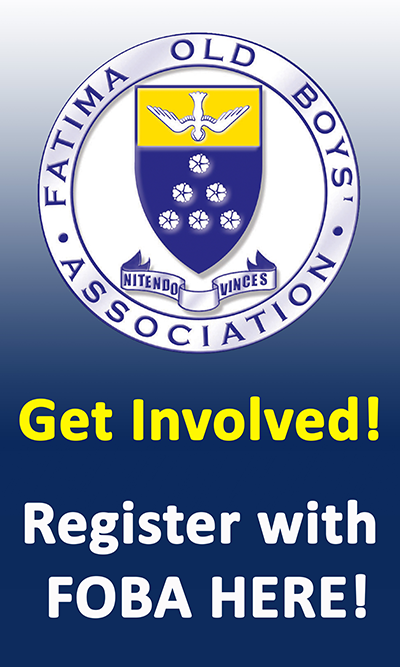- Views 6082
- Likes
Anthony at the Fatima Hall of Achievement Induction ceremony with wife Valerie
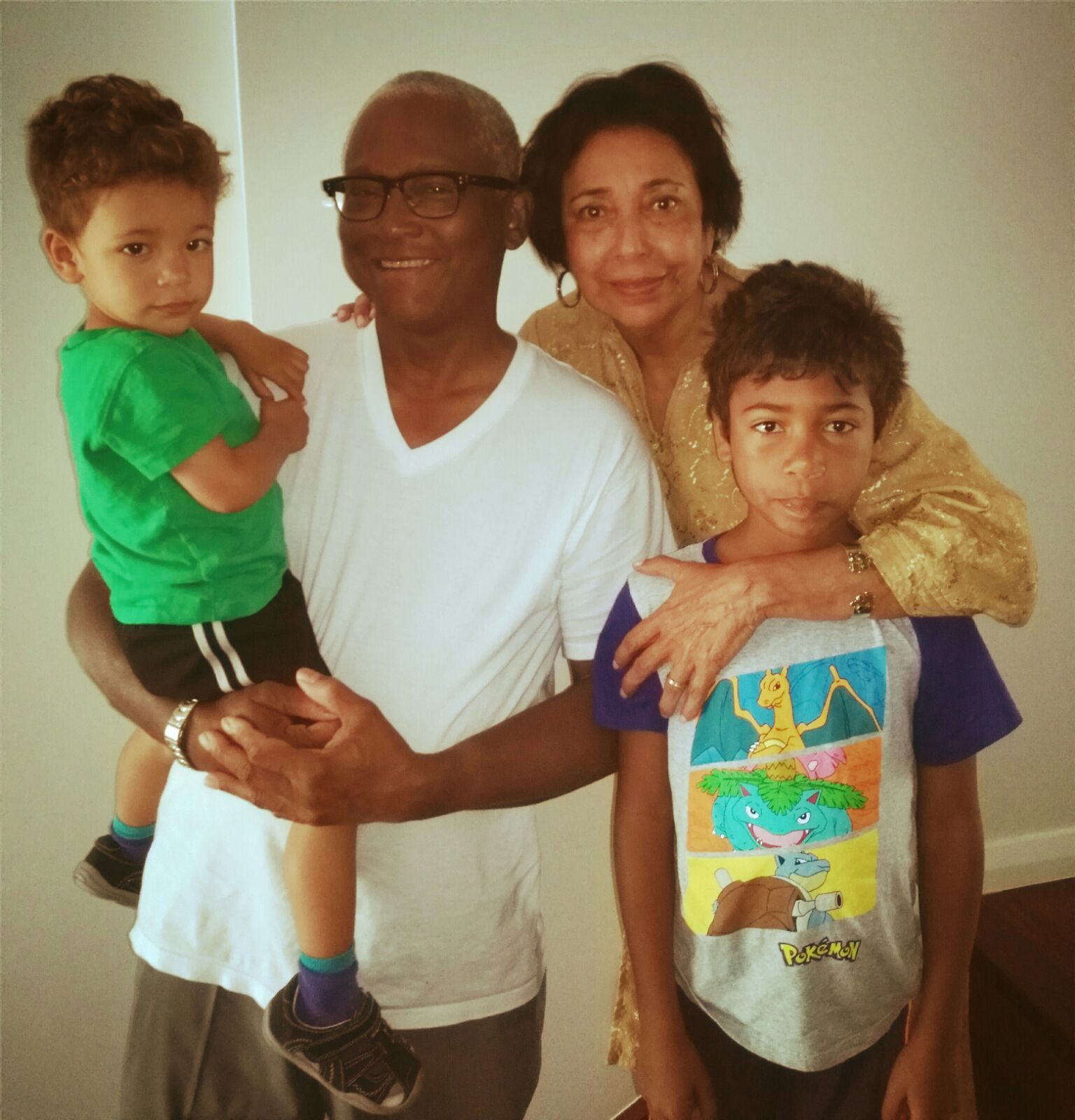
Anthony with wife Valerie and two grandchildren
Interviewer: Stefan Roach
Anthony Isidore Smart, instead of being burdened by his name, set out to make his life a living testimony to what being sensibly smart is all about.
After attending Fatima (1958-64) he taught at the College for one year before heading to the University of Toronto, obtaining his BA, majoring in Economics at age 21. He pivoted to the profession of his distinguished father, attorney Isidore Smart, and began practising as a Solicitor and Conveyancer from age 25.
He got into politics as one of the founders of the Organisation for National Reconstruction (ONR) and the National Alliance for Reconstruction (NAR); won a seat in Parliament in 1986; rose to become Deputy Speaker, Minister in the Office of the Attorney General and the Prime Minister, Chief Whip, and finally Attorney General at age 42.
The tragic attempted coup of 1990 saw AG Tony Smart displaying sterling qualities of courage and patriotism when he eluded the insurrectionists in Parliament and emerged to play a leading role in defending and preserving T&T’s democracy during the country’s most challenging period.
Q: Describe the culture of the school at that time?
A: It was a small school compared to St. Mary’s. It was new and relaxed and growing. We didn’t have a uniform at first. We got a uniform when I was in Form 4 – the dress uniform: blue blazer beaded in yellow and tie. Cows grazed in a pasture in the field opposite. From time to time, we would encounter cow dung. During my time, we started to raise funds to develop the playing field and it was a dream come true for me that in my last year, the playing field was completed with turf cricket wicket and pavillion.
Q: Who were some of your classmates that we may know?
A: Lennox Grant – a journalist, a past editor of the Guardian and Keith Smith – editor of the Express for many years who passed away a few years ago. These were both good friends of mine
Ken Attale – Lonsdale Satchi advertising founder. We sat next to each other for many years and shared a desk. We both lived in Belmont and rode to school together.
Conrad Aleong – once managing director of BWIA, and former head of the United Way Charitable Foundation.
Ewart Williams – former Governor at the Central Bank.
Q: What sports did you participate in?
A: I played cricket up to the Under-16 – A-Colts level. I was captain. I also played first class Basketball for Fatima and my team won Intercol. There were about 6 schools participating. I also played football but not to a high level.
Q: How did Fatima prepare for you for the leadership roles held throughout your career?
A: First of all, I was very happy as a student. The school, together with my parents, instilled in me the values of integrity, honesty and hard work. It was an enjoyable but disciplined school experience. We had stern teachers and relaxed teachers, but generally they were likeable.
I really liked Fr. Anthony Pantin who eventually became the Archbishop. He was the dean of discipline at Fatima and had a great impact on me. He was also a comedian. There was a guy called Hugh (Bosey) Edwards who was very popular for his jokes during recess. Students would gather around to hear Bosey talk and from time to time Fr. Anthony Pantin would join in the ole talk and match him joke for joke.
Q: What influenced your transition into politics?
A: The state of the country at the time after I completed my studies. I had studied economics in Canada then returned to Trinidad to do Law. At the time everything was breaking down…roads, telephones, the airport was in shambles, problems for water – I suppose a lot of the problems are still with us. Lots of infrastructural type issues. I felt like Dr. Eric Williams was not doing all he could for the people of the country. I felt the need to do something to improve our condition.
Q: Describe your greatest challenges during your time as Attorney General?
A: Dealing with the attempted coup! My greatest regret is that these murderers were able to walk free because of the failure of the judges who dealt with the case at the time, one judge in particular – the judge at first instance, Justice Brooks.
What is particularly irksome for me is that once a State of Emergency is declared, within 15 days the Government has to go to the Parliament and the Parliament by simple majority must extend the State of Emergency by 30 days or at most 60 days or else the State of Emergency lapses and all the powers exercised lapses, and therefore, the Government must free all the persons detained.
When I went to the Parliament to pilot the motion to extend the Stae of Emergency, I argued that the Amnesty document that was made with the Muslimeen was invalidated because after it was made, the Muslimeen continued to make demands. One was that Abu Bakr be made Minister of National Security. Imagine that that was the same argument that the Privy Council used later on to successfully throw out the Amnesty document. Unfortunately, the Muslimeen could not be re-arrested because of the technicality of being freed on a Habeas Corpus writ.
Q: How did you escape Parliament during the attempted coup?
A: Parliament was in session and I heard the gunshots. I assessed that they were coming from the western side of the Parliament chamber. I got up from my seat and ran away from the western side. As I got up, I saw guys entering with rifles. I ran across the Parliament chamber and went toward the eastern side which led onto a veranda on the upstairs portion of the building. Whilst running along the veranda, I saw men with rifles coming from the Trinity Cathedral running towards the Red House so I turned around and decided to hide. I passed by the AG’s office and saw two burly men standing by the entrance so I went downstairs by the vault area into a room. That room was actually at the eastern entrance to the Red House.
I hid under a counter and of course I was fearful because there were bullets flying and I was afraid of being hit through one of the windows which were low. I hid there for about 2 hours next to a lady from the kitchen staff. Muslimeen were in and out of the room and I could have heard them moving around and speaking. Eventually, they discovered 2 other ladies in the room, whom I didn’t know were there because they were also hiding. The Muslimeen told them “It’s not allyuh we want. It’s the big boys we want.”
The lady next to me then emerged from hiding. The lighting in the room was not that great. Two Muslimeen saw me and asked “Who’s you?” “Come out! Come out!”
I had discarded my jacket and tie and my glasses but I had a little pouch which I had my driver’s license in. They told me to come out, “you look like a special branch.” “Let me see your ID!” One had a rifle over me and the other had a pistol. The ladies in unison shouted “He is one of us!”
They then stopped their search. They didn’t look at my pouch too closely and handed it back to me and then showed us how to exit the Red House. We walked out and that’s when I saw the Police Headquarters on fire. The ladies and I crossed Hart Street and went separate ways.
Eventually, I went down to Independence Square where I encountered a Special Branch police officer in plain clothes who took me into a Maxi with him and took me to his home in La Horquetta.
Q: What would you consider to be appropriate justice for the atrocities caused on our country in 1990?
A: They should have been incarcerated for life. Maybe later in life they could have been set free if they behaved themselves properly. I am not a believer in Capital Punishment. I see at as the easy way out. I think that life in imprisonment is a worse punishment than capital punishment.
Q: You personally drafted the Code of Ethics for Ministers and Members of Parliament laid in the House of Representatives in 1988. Are you satisfied with the level of ethical conduct exhibited by our modern politicians?
A: No, it’s sadly lacking. It was terrible in the last administration and not enough effort is being made in this administration to demonstrate the importance of ethical behaviour.
Q: During your time as AG, why was it necessary to increase the compensation package for Judges?
A: They were not happy with their compensation and we wanted them to be happy. We improved the salaries for lawyers in the public service as well. With the increase in salaries for judges, lawyers were a lot more interested in going to the bench as judges.
Q: Briefly tell us about your law firm, ‘Gittens, Smart & Co., Solicitors and Conveyancers, Trinidad and Tobago’.
A: We did mainly conveyancing transferring of deeds and land transaction civil and probate and matrimonial work. We have bound documents of title for land in our vault going back to the 1930s.
Q: Does the study and practice of law hold the same prestige it did 30 years ago?
A: I guess not because there are so many more lawyers now, but there is still some prestige. There were less than 100 solicitors when I became one. Now there are thousands.
It is still in essence a very noble profession as well as a very practical profession. It touches every aspect of life from birth to death, including marriage. Nine members of my family are lawyers, including siblings, my daughter and nieces.
Q: Was there any merit to the formation of the Ministry of Justice?
A: Not really. I’ll tell you how that Ministry arose. Selwyn Richardson who joined the NAR after leaving the PNM during the 1986 election campaign was made the first Attorney General under the NAR Government. However, Robinson realized after a while that while he appreciated the role that Richardson had played in the election, he needed to remove him. He made me Attorney General but at the same time not wanting to humiliate Richardson, he simply added the title Justice to the Ministry of National Security. The portfolios of the Attorney General and Ministry of National Security remained exactly the same.
Subsequent administrations have tried to transfer some of the responsibilities of the Office of the Attorney General to the Ministry of Justice.
Q: How can the Judiciary improve in the speed of its delivery of justice?
A: There needs to be more judges. During my time, we introduced the CAT system, Computer Aided Transcription and there have been some innovations since then, such as Skyping. The leadership has to insist that the judges produce more!
However, I regret terribly what’s happening at the DPP Office. It seems to have completely collapsed. I call it the black hole…matters go in there and you never hear about them again. Maybe more lawyers and funds need to go to the Office to help with the production.
Q: Is it time for T&T to accede to the Caribbean Court of Justice?
A: It is long overdue. How can we call ourselves independent and still have to go to England as the final Court of Appeal. In fact it was in 1989 when I was AG, that ANR Robinson first floated the idea of the Caribbean Court of Appeal. It’s more than time now! It’s like a political football.
Q: You have served as a tutor at Hugh Wooding Law School and your law firm has provided in-service training to students of Hugh Wooding over the years. You were also a non-graduate teacher at Fatima College for one year. Is teaching one of your life’s callings?
A: I wouldn’t say teaching was my calling. Teaching was my mother’s calling. It was my wife Valerie’s calling. It was also my son Stokely’s calling. He is a qualified actuary and decided to abandon the commercial and corporate world and started the Actuarial Science Department at UWI.
My calling was to serve publicly, but in order to serve publicly, you have to get the approval of the people at elections. Nevertheless, I gave 22 years of my life to service of the people.
Q: Do you still have political aspirations?
A: No, I’m too old now. I think the firmament has changed where I don’t think my philosophy will be accepted. The NAR was about bringing people together rather than separating them by race. It was a fulfillment of my dream, but alas, it was short lived.
Q: You were appointed as an Observer of the general elections of Kenya in 1992. What did your duties entail?
A: We were given various territories in Kenya to observe during the run up to the elections. We attended meetings, spoke with people…really just seeing how the process went. Afterwards we wrote a report, and concluded that while there were some irregularities, the process was generally free and fair.
Q: You are well known for your legal career but are also a graduate in Economics from the University of Toronto. Is your present role as Chairman on the Board of First Citizens Bank the best example of your training in Economics playing a role in your career?
A: Economics actually played a bigger role in my political career. Banking is more restricted to just one area of the economy. I was brought in when there were serious allegations of insider trading with the IPO. The Government appointed me to chair a new board after they fired the old one to restore confidence in the bank.
Q: What did it mean to you, being inducted into the Fatima College Hall of Achievement?
A: It was one of the major achievements of my life. I was very proud to be recognized by my Alma Mater and I continue to contribute to and have a relationship with my school.
Q: Describe your family.
A: I have three children and two grandchildren. My eldest son is an actuary but also has an LLB. My daughter is lawyer and a chartered accountant and my youngest (son) is an electrical engineer with masters in solar energy. The boys went to Fatima of course.
Q: Has your hectic career negatively impacted your family life?
A: No, not really because I have a very devoted wife and mother to my children. I always tried to be there for my children, especially for school activities such as parent-teacher meetings, football matches and sports days.
Q: What do you do for recreation?
A: Golf. I used to run around the savannah in my younger days and sometimes even walked to Maracas. However, as I got older, running turned into walking and I eventually tried golf at the age of 57. I love golf. My life now revolves a lot around golf. It is a form of exercise, recreation and happiness. I also love to travel.
Q: Out of the countries, you have visited which was your favourite?
A: Well I’ve travelled quite a bit. Each country has it’s own charm. Florence is actually my favourite city. I’ve been there twice. I also like Scandanavia, Stokholm, Sweden…interesting places. Sydney has also impressed me. My daughter lives there and I’ve been there twice. I’ve been to the outback of Australia, Melbourne, Queensland, to the Great Barrier Reef. Sydney is a very exciting city…very clean. I like to say you could eat food off the floor of the public toilets in Sydney, they are so clean.
Q: Any advice to the many young graduates of Fatima College reading this interview?
A: Follow your dreams. Stand by the virtues and principles that Fatima has taught you. Try to do the right thing publicly, whilst it may not get you where you want to go. Don’t sacrifice your integrity and principles for material wealth.
Q: Any Closing Remarks?
A: My advice to anyone considering getting into politics is for them to be financially independent first so you could not be bought and sold. If you have a job or career to go back to after politics, it is easier for you to walk away from compromising your integrity.
